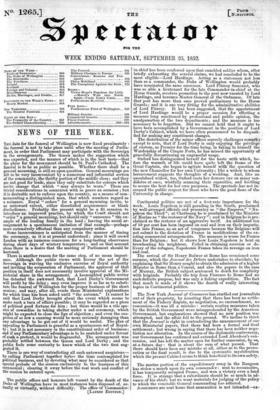in-chief has been conferred upon that ennobled soldier whom, after
briefly exhausting the several claims, we had concluded to be the most eligible—Lord Hardinge. Acting as a statesmannot less than as a commander, the Duke of Wellington would Probably have nominated the same successor. Lord Fitzroy Somerset, who was so able a lieutenant for the late Commander-in-chief at the Horse Guards, receives promotion to the post now vacated by Lord Hardinge, and becomes Master-General of the-Ordnance. Of late
that post has more than once ' proved preliminary to the Horse Guards • and it is one very fitting for the administrative abilities of Lord Fitzroy. It has been suggested, that the appointment of Lord Hardinge would be a proper occasion for effecting a measure long sanctioned by professional and public opinion, the amalgamation of the two departments ; and the measure is too necessary to be forgotten. But we cannot hold that it ought to have been accomplished by a Government in the position of Lord Derby's Cabinet, which we have often pronounced to be disquali- fied for making any constituent changes. • The distribution of the minor offices scarcely challenges reinatipr- except to note, that if Lord Derby is only enjoying the privfte of custom, as Premier for the time being, in taking to himself the Wardenship of the Cinque Ports, he has missed the opportunity of gracefully discontinuing an ungraceful usage.
Oxford has distinguished herself for the haste with which, be- fore the warmth of life could have quite left the frame of the Great Captain, she began to agitate herself with the question of the new Chancellor for her own University ; like a widow to whom bereavement suggests the thoughts of a. wedding. And, like an unsubdued widow, too, Offord casts her demure eye on many can- didates at once, wistfully scanning their capacities, and bustling to secure the best for her own purposes. • The spectacle has not in- creased the public respect for those who have the good fame of the University in charge.


























